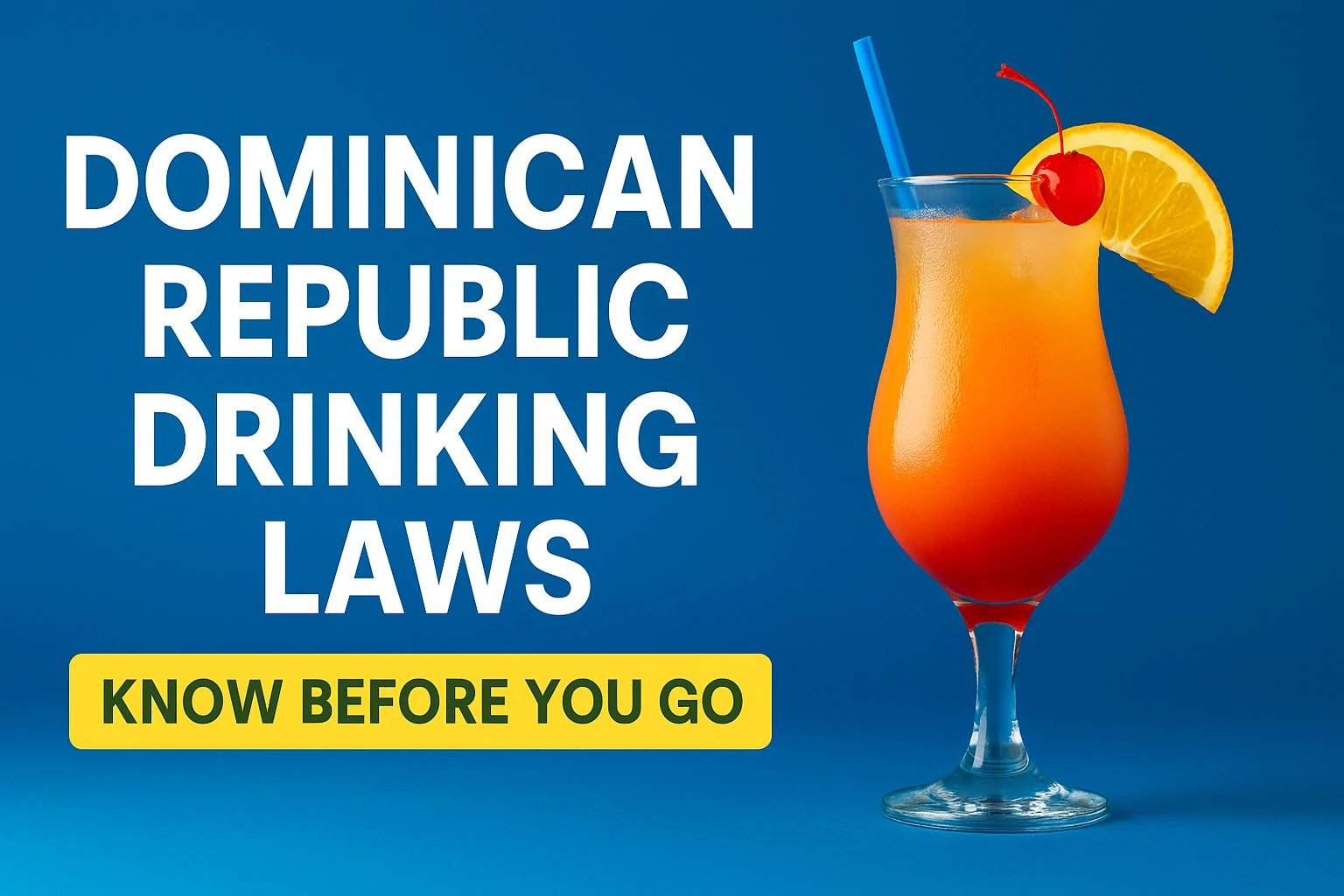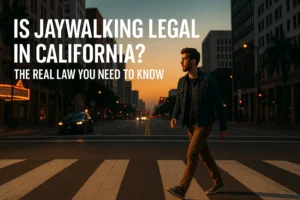The Dominican Republic offers music, beaches, and bright days. Tourists visit from many countries. They enjoy the sun, the breeze, and the calm pace of island life. Cold drinks, loud parties, and sweet rum are part of the scene. You see people smiling in beach bars, holding drinks near pools, and sharing beers by the shore.
The mood feels free. Many believe there are no real rules. Some think anything is allowed once they arrive. That idea is wrong. The Dominican Republic has clear alcohol laws. Some are strict. Others are more relaxed. All of them count.
Trouble starts when people ignore the law. Some tourists get tickets. Others get arrested. A few lose their license. Some cause harm to themselves or others. Most of it could be avoided with basic knowledge.
This article gives you that knowledge. It explains the drinking laws across the island. You will learn the legal age, where you can drink, how late bars stay open, and what happens if you break the law. Read this and enjoy your stay the smart way.
The Legal Drinking Age in the Dominican Republic
The legal drinking age in the Dominican Republic is 18. This law applies to both locals and tourists. If you are not 18, you cannot buy, carry, or drink alcohol anywhere in the country.
Most bars and stores ask for ID. Some tourist areas may not check, but that does not make it legal. If police see a minor with alcohol, they can act fast. You may get a warning, a fine, or face detention.
Adults who sell alcohol to minors face serious risk. Their business may lose its license. Police can shut down places that break this rule again and again.
Some parents let teens drink at home. But the law still applies in public. If you are under 18, stay away from alcohol in shops, clubs, or public streets. The risk is real. The law does not bend.
Where You Can Drink in Public and Private Spaces
You can drink alcohol in many places across the island. Bars, hotels, clubs, and homes are legal places to enjoy a drink. Most resorts offer drinks all day and night. Restaurants often include rum or beer on the menu. Supermarkets and liquor shops sell bottles without issue.
Still, not all areas are open to drinking. In many cities, public drinking is controlled. You cannot walk down a busy street with a beer in hand and assume it’s fine. Some local laws ban open alcohol in parks, sidewalks, or plazas. Police may approach if they see you with an open bottle. If the law is active in that area, they may issue a fine or take your drink.
Each town sets its own rules. What is allowed in Punta Cana may not be allowed in Santiago or Santo Domingo. In some places, drinking in public may be okay during festivals. But once the event ends, the rule returns.
To avoid problems, ask a local or staff member before opening a bottle outdoors. If in doubt, drink indoors or in licensed bars. It’s safer, easier, and more respectful to those around you.
When You Can Drink: Selling Hours and Curfews
The Dominican Republic sets time limits on alcohol sales. These limits change with the day and the location. Most bars stop serving alcohol at midnight during the week. On weekends, some stay open until two or three in the morning.
Tourist zones often have extra permits. These areas may allow later hours. Inside resorts, bars can stay open all night. These rules apply only within private property. Once outside, the public laws return.
On certain dates, the government may ban alcohol sales. This happens during elections and national holidays. These rules help avoid conflict and keep public order. The ban may last a few hours or the whole day. Locals call it a dry law.
Shops and markets also stop alcohol sales at night. Most close their drink section around 10:00 p.m. If you plan to buy late, you may find nothing available. It is smart to ask about local hours in advance. That helps you stay legal and avoid problems.
Open Containers and Street Drinking Rules
Drinking outside may seem normal in a place with warm nights and beach life. But open container laws still matter.
In some places, carrying an open beer or rum bottle in public is legal. In other towns, this can lead to a warning or even a fine. The police have the right to stop and check. If they see someone drunk and loud with an open drink, they may step in. If that person resists or causes a scene, things can get worse.
In tourist zones, you may see people drink on the beach or near bars. These spots often allow it. But once you move away from that area, the same drink becomes illegal in your hand. It’s best to use cups instead of cans or bottles when outside.
Cars are another concern. Never keep open bottles in the vehicle, even if no one drinks them. If the police stop you and see alcohol that has been opened, you may face legal questions. They may believe you drank and drove, which is a serious charge.
Drunk Driving Laws: A Serious Warning
Drunk driving is illegal in the Dominican Republic and punished harshly. The blood alcohol limit is 0.05%. That is a small amount. One or two drinks can put you over that limit. If you drive after drinking and get caught, the outcome is not good.
Police often stop drivers at night. They check for signs of drinking. If they think you have been drinking, they can ask for a breath test. If you fail the test, they can take you into custody. You may face jail, fines, or lose your license. Foreigners are not exempt. In fact, tourists may have to pay their fine right away.
Motorcycle riders also fall under the same law. A drunk rider can lose their bike or license. If a crash happens, they may face jail.
The best move is simple. Do not drive if you drink. Use taxis, apps, or hotel transport. It may cost a bit more but saves you from a bigger problem.
Bringing Alcohol Into or Out of the Country
Travelers can bring alcohol into the Dominican Republic, but only in small amounts. You can bring up to two liters of alcohol without paying tax. This covers wine, rum, or liquor for personal use. Anything more must be declared. Customs may charge you or hold your bags for checking.
Buying alcohol to take home is also allowed. Many tourists buy local rum or mamajuana to gift or enjoy later. Make sure your home country allows you to carry it. Some nations limit how much you can bring back.
Keep receipts with you. If airport staff questions the bottle, proof of purchase helps clear the way.
Penalties for Breaking the Drinking Laws
People who ignore drinking laws may face different levels of punishment. A first-time warning may seem light, but repeated offenses bring bigger problems.
If caught drinking in a banned area, police may take your drink and ask you to leave. If you stay calm, that may be the end. If you argue or resist, they may arrest you.
Drunk driving has the worst outcomes. You may pay a fine, stay in custody, or lose your ability to drive. In serious cases, you may appear in court.
If you cause harm to others, the law becomes even harder. In some cases, the injured person or their family may seek compensation under laws like loss of consortium after injury.
Selling alcohol to minors or without a license also brings fines. Businesses that break these laws risk losing everything.
Respecting the rules helps everyone. It keeps your trip fun, safe, and free from police trouble.
Understanding the Drinking Culture
In Dominican culture, drinking brings people together. It plays a role in music, meals, family events, and social nights. But even in celebration, people expect respect.
Loud, rude, or reckless behavior is not welcomed. Drinking in excess in public may lead others to avoid or report you. Locals enjoy a good drink, but they also value control and peace.
Tourists should try to blend in. Watch how locals act. Follow their lead. Drink slow. Laugh more. Keep your voice down in quiet areas. These small actions help you enjoy your time more and avoid unwanted attention.
Conclusion
The Dominican Republic is a land full of flavor, music, and joy. Alcohol is part of that joy, but so are rules. Drinking laws exist to protect people and keep order. They apply to everyone, no matter where you come from.
You can still enjoy the party, but do it with care. Know your limits. Know the laws. Respect the places where you drink. And never get behind the wheel after alcohol.
A fun trip does not need danger or legal trouble. If you need help understanding local laws or your legal rights, visit BestLawyerHub: Your Guide to Legal Help Made Simple. A smart drinker enjoys more and loses less.
This article shares general information about drinking laws in the Dominican Republic. It does not provide legal advice. Please check with a lawyer or local official for specific legal guidance.




